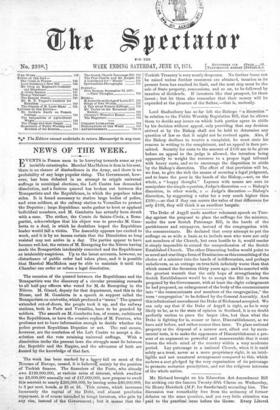The Duke of Argyll made another vehement speech on Tues-
day against the proposal to place the suffrage for the minister, under the new Scotch Patronage Bill, in the hands of the parishioners and ratepayers, instead of the congregation with the communicants. He declared that every attempt to put the suffrage on so wide a basis as to include men who were not only not members of the Church, but even hostile to it, would render it simply impossible to extend the comprehension of the Scotch Established Church. The other Dissenting bodies would point to so novel and startling a form of Erastianism as this committing of the choice of a minister into the hands of indifferentists, and perhaps unbelievers, as an outrage on true faith infinitely worse than that which caused the Secession thirty years ago; and he asserted with the greatest warmth that the only hope of strengthening the Scotch Establishment would be to accept the Bill in the form proposed by the Government, with at least the slight enlargement he had proposed, an enlargement of the body of the communicants into "the communicants and members of the congregation," the term 'congregation' to be defined by the General Assembly. And this infinitesimal amendment the Duke of Richmond accepted. We can only say that if the Duke of Argyll is right, as he is very likely to be, as to the state of opinion in Scotland, it is no doubt perfectly useless to press the larger idea, but then what the Duke is fighting for is, sooner or later, Disestablishment, as we have said before, and rather sooner than later. To place national property at the disposal of a narrow sect, sifted out by sacra- mental tests, is to make the opponents of Disestablishment a pre- sent of of an argument so powerful and unanswerable that it must leaven the whole mind of the country within a very moderate period. Lay patronage in a national Church, when it is used solely as a trust, never as a mere proprietary right, is an intel- ligible and not unnatural arrangement compared to this, which endows a sect pledged by the very organisation of its patronage to promote sectarian proselytism, and not the religious interests of the whole nation.


































